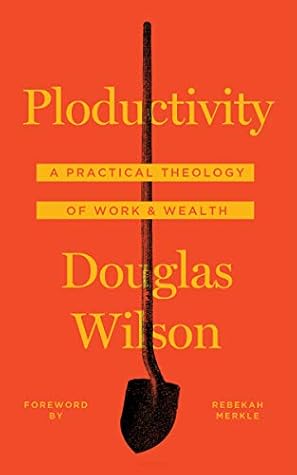More on this book
Community
Kindle Notes & Highlights
Read between
February 22 - March 28, 2023
The first step toward genuinely productive work is to make it a point to work coram Deo, in the presence of God.
Now if my body is a living sacrifice, this means that everything it rests upon is an altar.
Bearing fruit in every good work is fully pleasing to Him.
Living in the presence of God means that you are living in such a way as to invite or seek His favor. The Sabbath and the tithe illustrate well the trust we are to display in this. Would you rather work hard for seven unblessed days, or work hard for six blessed days? Would you rather try to live on a hundred percent of an unblessed income or on ninety percent of a blessed income?
Pray that God establish the work of your hands, and not just the work of your heart.
We are instructed to pray for quiet and peaceable lives (1 Tim. 2:2). A Christian should be able to be content whether he is out in the cold, or inside by the fire (Phil. 4:12).
In the cosmic scheme of things, the work that is assigned to us, and which God has given us to do, is tiny.
“But as it is written, Eye hath not seen, nor ear heard, neither have entered into the heart of man, the things which God hath prepared for them that love him” (1 Cor. 2:9).
George MacDonald once said that obedience is the great opener of eyes. The more we do, the more we will be able to do.
God is using the miniscule works that we are performing to teach us to trust Him, and to teach us the meaning of work.
Remembering the finitude of your labors will keep you humble. Recognizing that your labors have a place in God’s cosmic intentions for the universe will keep you from thinking that your tiny labors are stupid labors. They are nothing of the kind. Your labors in the Lord are not in vain (1 Cor. 15:58).
We are inveterate glory-seekers, and the thing that distinguishes a good man from a bad man is what he finds glorious—not whether he finds something glorious.
The pursuit of salvation is described by the apostle Paul as the pursuit of glory.
there is something wrong with a man settling too quickly, for the sake of avoiding too much responsibility or too much work.
So while it is reasonable to glance at the measuring stick goal from time to time, for the most part our gaze should be fixed on the work that is before us.
Another key to mastery is realizing that the key to originality is imitation.
Lewis again: “No man who values originality will ever be original. But try to tell the truth as you see it, try to do any bit of work as well as it can be done for the work’s sake, and what men call originality will come unsought.”
What plodding requires is predictability and routine. This is not a process that thrives in the midst of chaos.
We blow our fifteen-minute opportunities like they grew on trees.
An amazing amount of work can be accomplished through diligent plodding. But please note that I said plodding, not shuffling. There is a way of dragging your feet that doesn’t really accomplish anything remarkable either.
the thing to realize is how important those few minutes of reading are—important enough to make sure they happen every day.
once you have established the pattern, it joins the ranks of the other daily (but brief) habits you might have—like putting on your socks, or brushing your teeth. If you decide that “this is simply going to happen,” it is not that hard to find a minute to give to it.
But thou shalt remember the Lord thy God: for it is he that giveth thee power to get wealth, that he may establish his covenant which he sware unto thy fathers, as it is this day” (Deut. 8:10–18).
Jesus is the Lord of history, and this is why we don’t need to be afraid of Twitter. Or Facebook. Or teenagers typing with their thumbs. Jesus is the Lord of history, which is why we don’t need to worry about Google making us stupid.
There is nothing new about the modern world in this respect other than that more people are trying to cope with more blessings all at once than has ever happened before. That means more people are doing it poorly.
So we need to remember that the eschatological future promised by the prophet Isaiah, and the future that was shaped by the Industrial Revolution and will continue to be shaped by the Digital Revolution, are the same future.
The world, this world, is presently going where Jesus is taking it. So we should be wise, and stop worrying.
Wealth gotten by old-fashioned labor is sustained. Wealth gotten in the frothy way dissipates quickly (Prov. 13:11).
here is my central thesis, stated yet again: technology in all its forms is a type of wealth.
Until the resurrection, wealth is a good thing which always tends to distract us from our love for Christ, and the task at hand.
Carping criticism from outside, from some kind of Unabomber cabin, is not an effective response. It is not wise—even if you are gracious enough to write from a Wendell Berry cabin instead.


